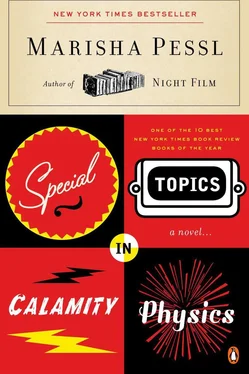And so my mother, “tying her duty, beauty, wit and fortunes / In an extravagant and wheeling stranger / Of here and everywhere,” fell for Dad’s tales of flood and field. They were married at a registrar in Pitts, New Jersey, with two witnesses recruited from a highway Huddle House: one, a truck driver; the other, a waitress named Peaches who hadn’t slept in four days and yawned thirty-two times (Dad counted) during the exchange of vows. Around this time Dad had been having disagreements with the conservative head of the Political Science Department at Columbia, culminating in a major blowout over an article Dad published in The Federal Journal of Foreign Affairs entitled “Steel-Toe Stilettos: The Designer Fashions of American Foreign Aid” (Vol. 45, No. 2, 1987). He quit midsemester. They moved to Oxford, Mississippi. Dad took a position teaching Conflict Resolution in the Third World at Ole Miss, while my mother worked for the Red Cross and began to catch butterflies.
I was born five months later. My mother decided to call me Blue, because for her first year of Lepidoptera study with the Southern Belles’ Association of Butterflies, with its Tuesday night meetings at the First Baptist Church (lectures included “Habitat, Conservation and Hindwing Coupling,” as well as “Attractive Showcase Display”), the Cassius Blue was the only butterfly Natasha could catch (see “Leptotes cassius,” Butterfly Dictionary , Meld, 2001 ed.). She tried different nets (canvas, muslin, mesh), perfumes (honeysuckle, patchouli), the various stalking techniques (upwind, downwind, crosswind) and the many netting swings (the Swoop, the Shorthanded Jackknife, the Lowsell-Pit Maneuver). Beatrice “Bee” Lowsell, President of SBAB, even met privately with Natasha on Sunday afternoons to coach her on Modes of the Butterfly Chase (the Zigzag, the Indirect Pursuit, the Speedy Snag, the Recovery) as well as the Art of Hiding One’s Shadow. Nothing worked. The Shy Yellow, the White Admiral, the Viceroy were repelled from my mother’s net like two same-sided magnets.
“Your mother decided it was a sign, so she decided to adore only catching Cassius Blues. She’d come home with about fifty of them every time she went into the fields and managed to become quite an expert on them. Sir Charles Erwin, Principal Lepidoptera Survival Specialist at the Surrey Museum of Insects in England, a man who evidently had appeared not once but four times on Bug Watch on the BBC, he actually phoned your mother to discuss Leptotes cassius feeding patterns on matured flowers of the lima bean.”
Whenever I voiced a particular hatred of my name, Dad always said the same thing: “You should be happy she wasn’t always catching the Swamp Metalmark or the Scarce Silver-spotted Flambeau.”
The Lafayette County Police told Dad Natasha had apparently fallen asleep at the wheel in broad daylight, and Dad admitted that, four or five months prior to the accident, Natasha had been known to work through the night on her butterflies. She’d fallen asleep in the oddest of places: cooking Dad Irish oatmeal at the stove, on the examination table as Dr. Moffet listened to her heart, even while riding the escalator between the first and second floors of Ridgeland Mall.
“I told her not to work so hard on the bugs,” Dad said. “After all, they were only a hobby. But she insisted on working through the night on those display cases, and she could be very bullheaded. When she had an idea, when she believed something, she wouldn’t let go of it. And still — she was as fragile as her own butterflies, an artist who feels things deeply. To be sensitive is fine, but it makes day-to-day living — life — rather painful, I’d imagine. I used to joke that when someone cut down a tree in the Brazilian Amazon, or stepped on a fire ant, or when a sparrow flew smack into a sliding glass door, it hurt her.”
If it weren’t for Dad’s anecdotes and observations (his pas de deux and attitudes ), I don’t know how much of her I’d remember. I was five when she died, and unfortunately, unlike those geniuses who boast vivid memories of their own births (“An earthquake underwater,” said renowned physicist Johann Schweitzer of the event. “Petrifying.”), my memory of life in Mississippi stutters and stalls like an engine that refuses to turn over.
Dad’s favorite photograph of Natasha is the one in black and white, taken before she ever met him, when she was twenty-one and dressed for a Victorian costume party (Visual Aid 1.0). (I no longer have the original photograph and so, where appropriate, I’ve supplied illustrations, drawn from what I can remember.) Although she is in the foreground, she seems about to drown in the rest of the room, a room overflowing with “bourgeois belongings,” as Dad would note with a sigh. (Those are real Picassos.)
And although Natasha stares almost directly at the camera and has an elegant yet approachable look on her face, I never feel a spark of recognition while surveying this blonde of pronounced cheekbone and superb hair. Nor can I associate this refined person with the cool and assured sense I do remember, however vaguely: the feel of her wrist in my hand, smooth as polished wood, as she led me into a classroom with orange carpet and a stench of glue, the way, when we were driving, her milky hair covered almost all of her right ear, though the edge still peeked out, barely, like a fish fin.

VISUAL AID 1.0
The day she died is thin and insubstantial too, and though I think I remember Dad sitting in a white bedroom making strange, strangled noises into his hands, and everywhere the smell of pollen and wet leaves, I wonder if this is not a Forced Memory, born of necessity and “iron will.” I do remember looking out to the spot where her white Plymouth had been parked by the lawn-mower shed, and seeing nothing but oil drips. And I remember, for a few days, until Dad was able to rearrange his lecture schedule, our next-door neighbor picked me up from kindergarten, a pretty woman in jeans who had short red porcupine hair and smelled of soap, and when we pulled into our driveway, she wouldn’t immediately unlock the car, but gripped the steering wheel, whispering how sorry she was — not to me, but to the garage door. She’d then light a cigarette and sit very still as the smoke squirmed around the rearview mirror.
I recall, too, how our house, once cumbersome and wheezing as a rheumatoid aunt, seemed tense and restrained without my mother, as if awaiting her return so it could feel comfortable to croak and groan again, allow the wooden floors to grimace under our hurried feet, let the screen door spank the door frame 2.25 times with every opening, consent to the curtain rods belching when an uncouth breeze barged through a window. The house simply refused to complain without her, and so until Dad and I packed up and left Oxford in 1993, it remained trapped in the ashamed, tight-lipped deportment required for Reverend Monty Howard’s dull sermons at the New Presbyterian Church, where Dad dropped me every Sunday morning while he waited in the parking lot of the McDonald’s across the street, eating hash-browns and reading The New Republic .
However not really remembered, you might imagine how a day like September 17, 1992, could float around in one’s mind when a particular teacher couldn’t remember one’s name and finally called one “Green.” I thought of September 17 at Poe-Richards Elementary, when I’d snuck into the murky stacks of the library to eat my lunch and read War and Peace (Tolstoy, 1865–69) or when Dad and I were driving a highway at night, and he’d lapsed into such strict silence, his profile looked carved on a totem pole. I’d stare out the window, at that black doily silhouette of passing trees, and experience an attack of the What Ifs. What If Dad hadn’t picked me up from school and she’d come to get me and, knowing I was in the backseat, made particular effort not to fall asleep — unrolling the window so her glossy hair flew all over the place (exposing her entire right ear), singing along with one of her favorite songs on the radio, “Revolution” by the Beatles? Or What If she hadn’t been asleep? What If she’d deliberately veered to the right at 80 mph crashing through the guardrail, colliding, head-on, with the wall of tulip poplar trees nine meters from the shoulder of the highway?
Читать дальше













